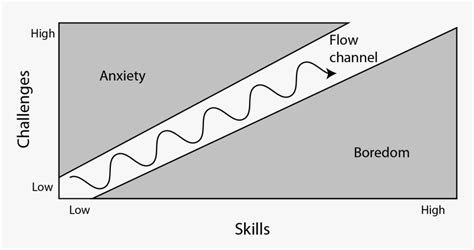Boredom, Grit, & Flow State

Date: July 2019
Subject: Jon Sanders
Field: Information Technology

In my interview with Jon Sanders a clear theme emerged related to learning, flow state, and his posture towards the unknown. Jon recounted story after story of learning new things and putting himself into situations that forced him to have to learn.
Here's Jon:
maybe it's something about my personality. I like venturing into the unknown. I feel like that has enabled me to succeed in a few areas in life. Like playing guitar for example, when you first grab it, you're gonna suck. It's gonna buzz and you're not gonna play the chords right. But you keep working on it. But it's like, you're not afraid to suck at it.
As he recounted that experience he said:
I remember when I first started playing guitar, I was kind of going through an Eric Clapton phase. I just loved Eric Clapton. I remember thinking, if I could just get good enough to play Tears in Heaven. I've done it. I made it. But then just a little while into learning, I was like, I can play it. It's actually not all that hard. I mean, I had to work at it. But I got it!
Then I'm like, what other song can I play? I better think of something else. So then you get to something more complex, and it's never ending. It's like, you know, you reach the thing, and you're like, okay, what's the next thing?
This hunger to learn and grow came through in so many of the stories that Jon told. Since challenges, facing the unknown, and learning all seemed to emerge as a theme I asked him about his experiences with flow state.
Flow is a term used to describe a mental state in which a person is completely absorbed in an activity, to the point of losing self-consciousness. This state is characterized by a sense of focus, creativity, and enjoyment that comes from engaging in a challenging task. Many athletes and musicians refer to this as "being in the zone" or "the pocket." It's a highly sought-after state, as it allows for peak performance and maximum enjoyment of an activity.
Jon immediately laughed and told me that sometimes when he is really focused on learning something new on his guitar he will suddenly drool on himself which is not only hilarious but clearly illustrates the lack of self-consciousness that such a state can induce.
Jon also shared another example from his youth, when playing baseball. He said that when up to bat he often felt completely absorbed in the task of hitting the ball. He describe feeling completely focused and not hearing anything else around him. He laughed and said that the same phenomenon also happens at his current job, where he manages a team of engineers. His co-workers say he has 'dad hearing' because his high level of focus and absorption when working on a task makes him deaf to all of them.
The way Jon got his start in IT work has an interesting connection to his love for learning as well:
I got into IT, because I was kind of a geek about anything to do with technology. I was just like, tinkering with computers, and software and stuff, you know, on my own as an amateur
I was at a soul crushing job with a pretty large company that I hated. I found out there was an opening in the IT department and I was like, I could do that. I see what this IT guy does, and I could do that all day long. So I applied for it and got the job. That's how I got into IT work. And that was great! So with the exact same company, doing one thing, I hated life, I hated waking up in the morning and going to that stupid job. For the same company, I got hired as an IT guy, and I loved it, I loved going to work everyday. Because I was tinkering around with computers and servers.
This job was great for Jon for several years until there was no longer challenging work for him to do. He continues:
eventually, you know, there's only so much you can do in IT at a single company. And so it kind of got to the point where I was mostly sitting around not doing anything, because, you know, you can only fix the same server so many times, and then it just usually didn't have any problems. I mean something will happen every once in a while but we just kind of ran out of work to do, and they were happy to keep paying me for as long as I wanted to be there. I just got bored. So anyway, I ended up getting a job at a different IT company. making less money, by the way. But I just got so bored. It went from like really enjoying it and having work to do and learning a lot to being bored out of my mind.
So then what?
I transitioned to a what's called a managed service provider. That's an outsourced IT company. So businesses hire those kind of companies to be the IT staff. When I first started at that company, they were managing 40 different businesses. So we were managing the IT network for 40 different companies. I worked there for five years and when I left there, we were managing 100 different companies. So there was a ton of work to do. There was always something going on. Every business has a different network environment. So it was always different. So it kept my attention. Whenever I would go into work I was like 'I have no idea what I'm going to see today.' But it was probably going to be something new that I'd never seen before.
According to psychologist Mihaly Csikszentmihalyi, flow state is a state of complete absorption in an activity where one is fully engaged and enjoying the process. When we experience flow state, we feel energized and motivated to continue the activity. Jon's story highlights that in the context of work, it can be interpreted as feeling a sense of purpose and challenge in one's job, which can help prevent boredom. His experiences demonstrate that when he was constantly presented with new challenges, he was more engaged and motivated to do the work. This seems to be something that is centrally important to Jon as he even switched to a lower paying job when the previous one no longer presented him with challenges or opportunities to grow.
As Jon reflected on his own story, he said he looks for the same attribute in engineers that he hires. He said:
I've been in a position for a while now where I have to hire engineers. I've had to hire and fire a bunch of people. And the technicians that are successful have that trait, where they're not afraid to go into an issue and figure it out. There's other engineers that haven't been successful, especially in the industry I'm in where they're very quick to throw their hands up. They hit a wall of knowledge and they're like, I don't know, I'm not sure about this. They throw their hands up and there's no pushing past that wall of their knowledge. And so I don't know what to call that thing, where it's like, where you kind of come up against the world that you know, and you want to push back
Since he didn't have a word for the attribute he was describing, I shared a bit about Angela Duckworth's work on Grit. Grit is a personality trait that refers to perseverance and determination. It's the quality of having a strong work ethic and being willing to work hard and persist in the face of obstacles. People with high levels of grit are typically able to achieve their goals, even if it takes a long time and requires a lot of effort.
The connection between flow state and grit is clear: both require a high level of focus and determination. To achieve flow state, a person must be fully engaged in a task and willing to push through difficulties and distractions. Similarly, to exhibit grit, a person must be motivated to keep working towards a goal, even when it becomes challenging. A person's level of grit and determination can impact their ability to achieve flow state.
Flow state and grit are two key components of performance that are deeply connected. Both require a high level of focus, determination, and engagement to be achieved. Understanding the connection between these two concepts can help individuals to better understand how to maximize their potential for peak performance and enjoyment, both in their personal and professional lives. I think Jon is an incredible example of seeking out challenging work and consistently choosing challenge over boredom.
If you would like to hear the rest of our conversation check out Episode 2 of the WorkEthicPodcast.com
